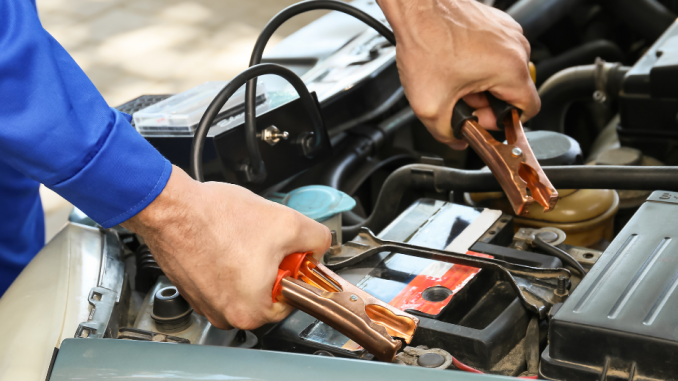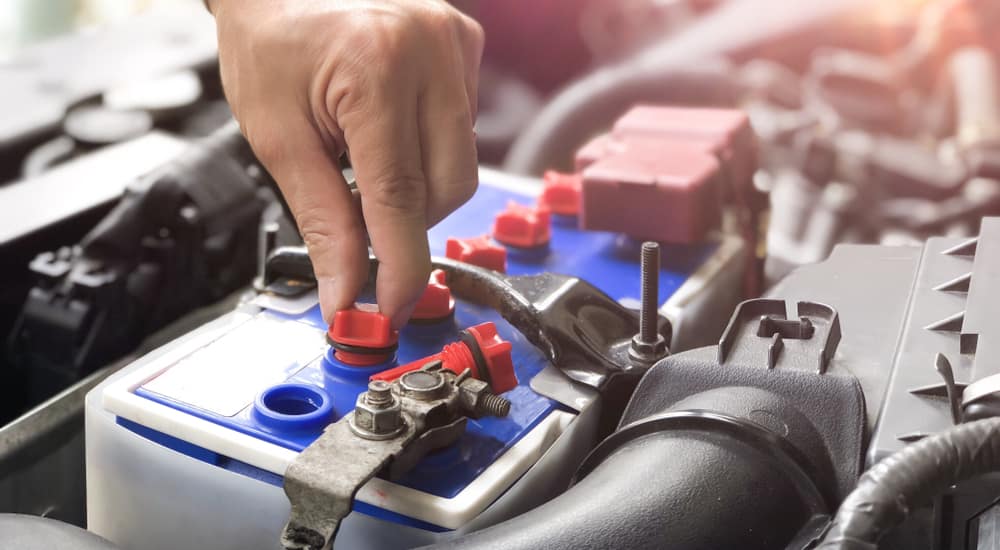Blog
How to Maintain Your Car Battery and Extend Its Life
- By Jimmy G's Automotive
- May 02, 2024
- Brake Repair Services
- 0 comments

1. Regular Inspection and Cleaning
- Check for Corrosion: Corrosion on battery terminals can block electricity flow. Regularly inspect the terminals for any white, ashy substance.
- Clean the Terminals: If you notice corrosion, clean it with a mixture of baking soda and water. Use a wire brush to scrub gently.
- Secure the Battery: Ensure the battery is tightly mounted to prevent vibrations that can damage it.
2. Maintain Charge Levels
- Drive Regularly: Regular driving keeps the battery charged. If you don’t drive often, use a battery maintainer.
- Avoid Short Trips: Short trips prevent the battery from fully charging. Aim for longer drives.
- Turn Off Electronics: Before turning off your car, make sure all electronics (lights, radio, etc.) are off to avoid draining the battery.
3. Monitor Battery Health
- Test the Battery: Use a multimeter to check the battery voltage regularly. A healthy battery should read between 12.4 and 12.7 volts.
- Look for Signs of Aging: Slow engine crank, dim lights, and the check engine light are common signs of an aging battery. If you notice these, it might be time for a replacement.
4. Environmental Considerations
- Protect from Extreme Temperatures: Extreme heat and cold can affect battery performance. Park in a garage or use a battery blanket in winter.
- Avoid Overcharging: Overcharging can lead to overheating and damage. Use a smart charger that stops charging when the battery is full.
5. Routine Maintenance Practices
- Check Electrolyte Levels: For batteries with removable caps, check the electrolyte levels and top up with distilled water if necessary.
- Inspect Battery Case: Look for any cracks or bulges in the battery case, which indicate it needs to be replaced.
6. Professional Assistance
- Regular Checkups: Have your battery checked by a professional during routine car maintenance.
- Replacement: If your battery is over three years old, consider having it tested and replaced if necessary.
7. Safety Precautions
- Wear Protective Gear: Always wear gloves and safety glasses when working on your battery.
- Disconnect Safely: Disconnect the negative terminal first to prevent short circuits.
Maintaining your car battery doesn’t have to be a challenging task. With regular checks and a few preventive measures, you can extend your battery’s life and avoid unexpected breakdowns. Keep this guide handy and make battery maintenance a part of your routine car care.

Understanding Car Batteries
A car battery provides the necessary power to start your vehicle and run electrical components. Understanding how it works helps in maintaining it better.
Types of Car Batteries
- Lead-Acid Batteries: These are the most common and are known for their reliability.
- Absorbent Glass Mat (AGM) Batteries: These are more expensive but offer better performance and longevity.
- Lithium-Ion Batteries: Typically found in electric vehicles, these are lightweight and have a longer life.
Common Battery Issues
- Battery Drain
- Parasitic Drain: This occurs when something in the car continues to use power even when the vehicle is off.
- Self-Discharge: All batteries lose charge over time, but this can be accelerated by extreme temperatures.
Tips for Prolonging Battery Life
- Regular Use
- Drive Frequently: Batteries maintain their charge better when the car is driven regularly.
- Avoid Prolonged Idleness: If you plan not to use your car for an extended period, consider disconnecting the battery.
- Proper Charging
- Use the Right Charger: Always use a charger compatible with your battery type.
- Avoid Deep Discharges: Try not to let your battery discharge completely before recharging.
Proper Charging
- Use the Right Charger: Always use a charger compatible with your battery type.
- Avoid Deep Discharges: Try not to let your battery discharge completely before recharging.
Signs You Need a New Battery
Age
- Age
- Typical Lifespan: Most car batteries last between 3-5 years. After this period, they become less reliable.
- Frequent Issues: If you notice frequent battery problems, it might be time for a replacement.
- Performance
- Slow Start: A slow engine crank is often a sign of a weak battery.
- Dim Lights: If your headlights are dim, it could indicate a failing battery.
Performance
- Slow Start: A slow engine crank is often a sign of a weak battery.
- Dim Lights: If your headlights are dim, it could indicate a failing battery.
How to Replace a Car Battery
Disclaimer: The following instructions are general guidelines. Car models vary, and European cars, in particular, might have different requirements. Always refer to your vehicle’s manual or consult with a professional mechanic.
Replacing a car battery is straightforward if you follow the correct steps.
Tools You’ll Need
- Wrench Set: To remove the battery terminals.
- Battery Cleaner: To clean any corrosion.
- New Battery: Ensure it matches the specifications of your old one.
Step-by-Step Guide
- Turn Off the Engine: Safety first—make sure your car is off.
- Disconnect the Terminals: Start with the negative terminal to avoid any short circuits.
- Remove the Old Battery: Carefully lift it out of its tray.
- Clean the Terminals: Use a battery cleaner to remove any corrosion.
- Install the New Battery: Place the new battery in the tray and secure it.
- Reconnect the Terminals: Attach the positive terminal first, followed by the negative.
Additional Information About the Charging System:
In many cars, the battery is crucial for starting the vehicle and running electrical components. With a good alternator, some cars can run even if the battery is removed, but this is only for short periods and testing purposes. However, it is not recommended to operate your vehicle without a battery for extended periods as it can cause damage to the car’s electrical system.
Conclusion
Maintaining your car battery is essential for your vehicle’s performance and reliability. By following these steps, you can ensure your battery remains in good condition for years to come. Regular checks, proper charging habits, and understanding when to seek professional help will help you avoid unexpected breakdowns. Remember, a well-maintained battery not only extends its life but also ensures your car runs smoothly and efficiently.